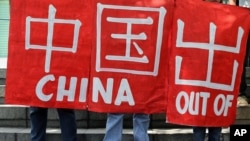Even though tensions over the disputed islands in the South China Sea have recently been heightened, analysts believe countries in the region face a conundrum: speaking out aggressively against China while at the same time improving economic ties with the Asian giant.
This balance is becoming evident in the Philippines, a treaty ally of the U.S. and an important trading partner with China.
"China has become an important trading partner of the Philippines," said the Philippine ambassador to the United Sates, Jose Cuisia, in an interview with VOA. "Our commercial relationship continues to grow."
The comments by the ambassador come after the recently concluded Shangri-La Dialogue in Singapore, where U.S. Secretary of Defense Ash Carter announced the launch of a new Southeast Asia Maritime Security Initiative.
Only weeks before, reports showed China taking a more assertive stance and building islets on the disputed islands.
But analysts believe the Philippines, one of the most vocal claimants in the South China Sea, is trying to find a balance.
Importance of trade
The Philippines has claims over the Paracel and Spratly islands in the South China Sea, or the West Philippine Sea as it is called by Manila, according to the Council on Foreign Relations, a Washington-based research group.
Despite the tensions between China and the Philippines over overlapping claims, the ambassador said it should not affect broader relations.
"The relationship with China is a broader issue than just one aspect which (is) experiencing some turbulence," he said, referring to the South China Sea.
China is among the largest trading partners for the Philippines. Between 2012 and 2013, exports to China grew by nearly 14 percent while imports from China grew by more than 20 percent, according to the Philippine Statistics Authority.
In the first semester of 2014, the Philippines imported the most from China, far outstripping imports from the United States.
Some analysts believe the U.S. is losing out by providing security in the region while China reaps the economic benefits from countries like the Philippines.
"For some Southeast Asians (countries) the presence of the 7th Fleet, the American naval presence in those waters, provides an assurance on the security side that enables these countries to go to Beijing and make money," said Donald Emmerson, director of the Southeast Asia program at Stanford University.
There also are signs that the Philippines is dependent on China.
A Chinese state-owned corporation owns a 40 percent stake in the National Grid Corporation of the Philippines, which runs the country's power grid.
The Trans-Pacific Partnership, a trading block currently under negotiations between 12 countries, will not include the Philippines. Cuisia, the Philippine ambassador, said the country hopes to be part of the TPP in the future, but currently restrictions on foreign ownership do not make joining the bloc possible.
Instead, there are talks about the Philippines negotiating to join the Regional Comprehensive Economic Partnership, a China-led trading bloc.
Improved relations possible
According to some analysts, the 2016 presidential elections and a change in leadership could see improving relations between the two countries.
"I don't think the next administration in the Philippines can just roll over and allow China to do what it wants," said Richard Heydarian, an assistant professor at De La Salle University in Manila.
"(But) at the very least, the next administration in the Philippines will adopt a much more subtle language…that will bring necessary Chinese investments in the Philippines," said Heydarian, who served as an advisor at the Philippine House of Representatives.
One of the front runners in next year's elections, Vice President Jejomar Binay, has been vocal in the need for the Philippines to engage with China, Heydarian said.
However, a soft position on China won't be popular in the country, said Ernest Bower, the Sumitro Chair for South Asia Studies at the Center for Strategic and International Studies in Washington.
"But in practice, once someone's in power we have to watch very closely then to see what happens," Bower added.
Most vocal claimant
While the trade and economic potential China holds are undisputed, the Philippines has been among the most vocal countries involved in the South China Sea dispute.
The Philippines and the United States signed a defense treaty in 1951, and last year the two countries signed an agreement that would allow U.S. forces to rotate in the country without setting up permanent facilities.
"Our commitment to defend the Philippines is ironclad, and the United States will keep that commitment, because allies never stand alone," President Obama said last year after the signing.
Cuisia, the Philippine ambassador, said the aim of the agreement, known as the Enhanced Defense Cooperation Agreement (EDCA), is to help build the capacity of the country's armed forces and maintain a "minimum credible defense posture."
The Philippines also was the first country in the region to take a legal route to try to resolve the dispute over the islands.
It initiated a case against China's claims over the South China Sea dispute to the Permanent Court of Arbitration.
Even though China has said the court does not have jurisdiction over the issue, analysts believe the ruling is aimed at giving more legitimacy to the Philippine claims.











